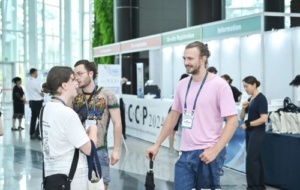ICCP 2024: Cloud Research Travel Report
 Travel report for Old Members’ Trust Graduate Conference and Academic Travel Fund– Peter Manshausen (2020, DPhil Atmospheric, Oceanic and Planetary Physics)
Travel report for Old Members’ Trust Graduate Conference and Academic Travel Fund– Peter Manshausen (2020, DPhil Atmospheric, Oceanic and Planetary Physics)
In the third week of July 2024, I attended the International Conference on Clouds and Precipitation (ICCP), which was held in Jeju Island, South Korea. I was financially supported by Univ’s Old Members’ Trust Graduate Conference and Academic Travel Fund, alongside funds from my research group. Attending ICCP, which is the largest and most important conference on clouds, gave me the opportunity to present my DPhil research to world experts, to network with scientists, and to explore what is known in Korea as ‘honeymoon island’.

Poster session discussion
The conference takes place only every four years (Olympic years), with the last one in 2020 being cancelled due to Covid. Therefore, it was a unique chance to present my efforts at cloud science, which, likewise, had been four years in the making. Being held so rarely, researchers from around the world make the trip, and being held in Korea, the conference attracted many researchers from East Asia, that I had not met at European conferences.
ICCP is also special in how focussed it is—with only two parallel sessions, I still struggled more to choose between talks than at big generalist conferences like the European Geosciences Union General Assembly. At ICCP, everything is about clouds, and almost everything is relevant to my research. This makes for a very intense, but very rewarding experience, where I could have informed discussions about everyone’s research projects.

Visiting Busan
Important research questions that were explored include: “How exactly do droplets grow in clouds to form rain?”, “What are the effects of air pollution on the brightness of clouds?”, “How realistic is it to modify clouds artificially to counteract global warming?”, and “How will climate change affect clouds and rain by the end of the century?” These fascinating questions and research projects addressing were very inspiring for me. My own talk, titled “What can (invisible) ship tracks teach us about geoengineering?” gave rise to some interesting discussions on methodology, on whether the anomalously high 2023 and 2024 global temperatures are linked to the recent reduction of shipping emissions, and on geoengineering.
I had the opportunity to meet, among others, Thara Prabhakaran, from the Indian Institute of Tropical Meteorology, Blaž Gasparini from Vienna, and to discuss at length with Sue van den Heever, who is a Visiting Professor in Oxford. I also had some potentially important career discussions with other attendees, as well as a lot of fun in going out for dinner and hiking together.

Hiking in Seoraksan National Park
Jeju Island is formed by a large, extinct volcano, which gives rise to beautiful rock formations down to the coast, a fertile soil for tangerine plantations, and great views from the peak. I had a wonderful time exploring the forested sides of the volcano and the coastal walks, as well as continuing my trip after the conference to visit Busan, Seoul, and the Seoraksan National Park. Altogether it was a very rewarding trip both personally and professionally and I am very thankful to Univ for the support.
Published: 11 October 2024
